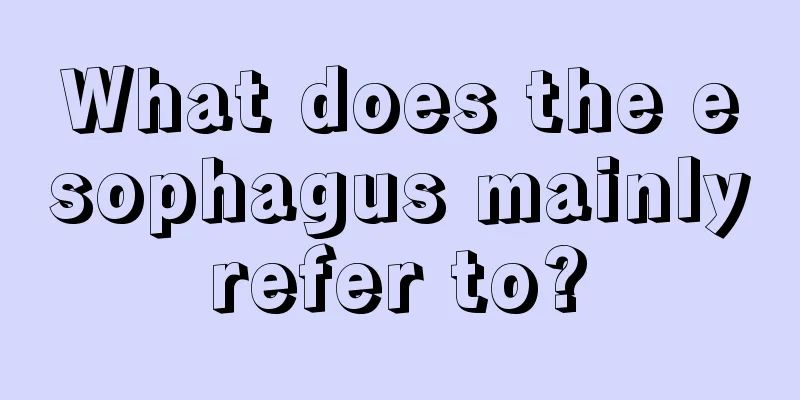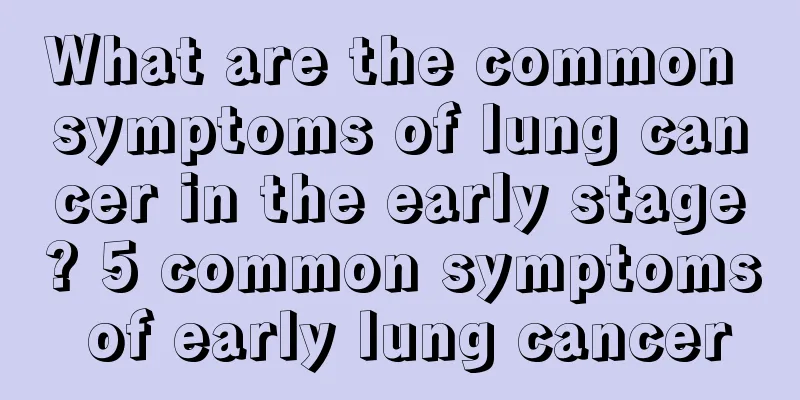What does the esophagus mainly refer to?

|
We all know that the food we eat is transported into the body through our esophagus. Without the transportation of the esophagus, our body will not be able to maintain normal operation, so the esophagus is very important to us. Do you want to know more about this good friend that connects our body? The esophagus is the digestive tube between the pharynx and the stomach. The esophagus is initially short in systemic development and gradually grows longer as the neck lengthens and the heart and lungs descend. When food enters the throat, it triggers the swallowing reflex, and from then on the digestion process is out of the control of self-consciousness. This swallowing reflex action is mainly peristalsis to push food into the stomach. At the very end of the esophagus where it meets the stomach there is a sphincter that prevents stomach acid from flowing back into the esophagus. Control of esophageal motility The striated muscles in the upper esophagus are innervated by the glossopharyngeal and vagus nerves. These motor neuron endings enter the skeletal muscle in the form of motor end plates. Injection of curare can block the peristalsis of this part of the esophagus. The vagus nerve also innervates the smooth muscle of the rest of the esophagus. Its preganglionic fiber endings synapse with the ganglion cells of the nerve plexus in the esophageal wall, and then send out postganglionic fibers to innervate the smooth muscle cells. Both preganglionic and postganglionic fibers are excitatory cholestatic fibers. When swallowing, the swallowing center is excited through the above-mentioned motor neurons and vagus nerve efferent fibers, causing peristalsis of the muscles in various segments of the esophagus. The nerve plexus within the esophageal wall can control esophageal motility independently of external nerves. The sympathetic nerves that innervate the lower esophageal sphincter also contain excitatory fibers. Contraction of this sphincter at rest is caused by the action of norepinephrine on α-receptors on sphincter cells. Sympathetic nerve impulses cause the lower esophageal sphincter to contract by stimulating the myenteric nerve plexus within the esophageal wall. I believe everyone knows the importance of the esophagus to our body. In our daily life, we must protect our esophagus well and avoid eating things that can easily scratch the esophagus. There are many esophageal diseases in society today, serious ones may even endanger our lives, so everyone must take good care of their bodies. |
<<: What kind of shoes should I wear when dancing?
>>: What is the use of expired pure milk?
Recommend
9 daily health tips to help you stay healthy and live longer
Health care needs long-term persistence to be eff...
There are 4 major issues to pay attention to in preventing breast cancer
Good breast health care can prevent the occurrenc...
This is how to get rid of eye bruises
Eye bruises are very common in daily life, but th...
Drugs to prevent cervical cancer metastasis after surgery
What medicine can be taken after cervical cancer ...
What are the effects of alfalfa enzyme
Many people may not know what effects and functio...
Detailed introduction to effective methods for treating colorectal cancer
In recent years, the incidence of colorectal canc...
Traditional Chinese Medicine Treatment for Recurrent Lymphoma
Lymphoma is a disease with a high incidence and m...
Throat hurts after wisdom tooth extraction
In daily life, many people will grow wisdom teeth...
What are the early symptoms of colorectal cancer?
The incidence of colorectal cancer is very high i...
How should advanced colon cancer be treated?
Colon cancer is a common digestive tract malignan...
Can pure silver be soaked in water and drunk?
Pure silver can be used to soak in water for drin...
What are the reasons for blood blisters in the mouth when eating
Many people often have blood blisters in their mo...
What tea cures cough
Chinese people all love to drink tea, and there h...
What to eat in the late stage of liver cancer? Introduction to dietary precautions in the late stage of liver cancer
What to eat is very important for patients with a...
People would be better off learning to recognize the symptoms of brain cancer
It is terrifying if people do not discover cancer...









